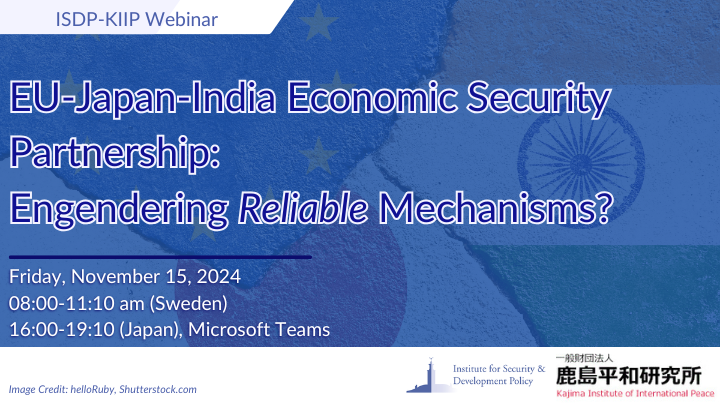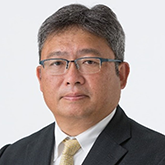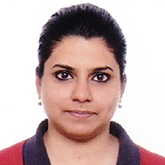EU-Japan-India Economic Security Partnership: Engendering Reliable Mechanisms?

Friday 15 November 2024 / 08:00 - 11:10 / Microsoft Teams
Webinar. Microsoft Teams, Webinar .
RSVP Register here
Did you miss this webinar? The full recording is available on ISDP’s YouTube channel.
Undoubtedly, economic security is not just a buzzword for partnerships in the Indo-Pacific – the region recognized by the leading economies as the world’s geo-economic and geo-strategic center of gravity. In the post-pandemic world, the fragility and risks to market economies have increased exponentially. Importantly, the world’s trade dependency on China, including the European Union (EU), its members, India, and Japan; China’s dominance in manufacturing; and China’s tendency to weaponize trade have exposed and rattled the world’s economies.
In particular, China’s economic coercion against its long-standing partners like Australia and the EU has become a major hindrance for governments simply looking to augment or at least stabilize their economic growth. Moreover, Indo-Pacific partners have begun to recognize the geopolitical long game to China’s economic misbehavior. Simply put, China’s economic coercion is one of the tools of China’s ruling regime to refashion the existing liberal world order into a Sino-centric one in the future.
On top of that, the world is also reeling under the impact of the continuing war in Eastern Europe, the growing intensity of the war in West Asia, and the ever-present and ever-growing strategic competition between China and the US, among other geopolitical risks. Against such a bleak scenario, countries the world over have started to seriously look into recalibrating the risks associated with such (over)exposure and reconfiguring their economic priorities.
In this regard, the EU – which has been facing a period of economic instability due to Russia’s prolonged war in Ukraine, inflation, and slow growth – seems intent on mitigating the risks and increasing the opportunities. Geopolitically, it has advanced the relations with Indo-Pacific partners like Japan and India that are reliable; have common interests such as in technology, connectivity, trade, and finance sectors; and could provide a stable growth trajectory. Notably, the EU’s initiatives like the Global Gateway under the “Strategy for Cooperation in the Indo-Pacific” umbrella have the potential to combine the developmental, infrastructural, and connectivity goals with economic opportunities for Europe.
With India, the EU’s new technology-led economic cooperation (e.g., the Trade and Technology Council and a memorandum of understanding [MoU] on semiconductors) is pushing the boundaries. Similarly, the EU is strengthening its Economic Partnership Agreement (EPA) with Japan by focusing on newer areas such as supply chain resilience for semiconductors and other critical materials.
Japan which intends to assume a greater global and regional leadership role, too, is boosting its economic strategy, including initiatives to make critical supply chains resilient. International partnerships with “like-minded” Indo-Pacific stakeholders are an integral part of its economic security goals in sectors such as infrastructure development and technological innovation.
India, which is one of the fastest-growing economies, and yet a developing one, has a unique set of challenges. It is looking to not only diversify its trade practices via its multi-aligned diplomatic approach but also face an existential threat from its nuclear neighbors, namely China and Pakistan. Domestic and regional development, including infrastructure connectivity, is also key for its foreign policy. So, partnerships with reliable economic and security partners become exceptionally vital for the country, which has been marked by multiple outlooks as the next possible superpower.
For all three partners, outreach to the Global South countries, including in India’s neighborhood such as Nepal and Bhutan, for their development and alleviation of immediate concerns such as climate change is extremely important. This will also facilitate stabilizing the international order that is in crisis.
This webinar jointly organized by the Institute for Security and Development Policy (ISDP) in Sweden, and the Kajima Institute of International Peace (KIIP) in Japan explores the conditions for forging an EU-India-Japan economic security partnership. With some of the finest experts, this online event aims to address the following questions:
- What are the prerequisites for an enhanced EU-India-Japan economic security cooperation?
- Could the EU, Japan, and India forge a common perspective on economic security? Can such measures mitigate geopolitical risks and propel regional stability? How?
- To what degree can connectivity and infrastructure influence this potential economic security partnership?
- Could the India-EU Trade & Technology Council complement Japan’s ties with the EU? In what ways? What can they do to promote a digital economy and resilient infrastructure in the broader Indo-Pacific region? How should the three partners navigate challenges and move toward an enduring partnership?
- To what extent will the Middle East crises, including the Israel-Hamas war that escalated to directly include Lebanon and Iran, and the war on Ukraine deter such economic security partnerships in the Indo-Pacific?
- For example, will minilateral (with a bigger multilateral cross-continental collaborative intent) initiatives such as the India-Middle East-Europe Economic Corridor (IMEC) see the light of day? Could Japan which had attended the IMEC launch event at the 2023 G20 summit and is a credible bilateral partner for both Europe and India be involved in some capacity, if the project gets reinvigorated?
- How can members India and Japan facilitate the EU to partner with the Indo-Pacific Economic Framework for Prosperity (IPEF) in boosting supply chain resilience – a common goal with the EU, for which the IPEF members have signed a first-of-its-kind pact?
- What would be their common strategy to counter China’s economic coercion and boost their own competitiveness?
Speakers:
 Dr. Nicolas Blarel is an Associate Professor of International Relations at the Institute of Political Science, Leiden University in The Netherlands. He studies foreign and security policy-making, the politics of power transition in the international order, the politics of migration governance, and the international politics of South Asia. His current research project centers more specifically on the decentralisation and regionalisation of the foreign policy decision-making process in India. He has also recently written with Niels van Willigen on the EU’s Indo-Pacific strategy. Nicolas has also studied India’s relations with the Middle East and has published The Evolution of India’s Israel Policy: Continuity, Change, and Compromise since 1922 (Oxford University Press, 2015) and co-edited with Crystal Ennis the book South Asia to Gulf Migration Governance Complex (Bristol University Press).
Dr. Nicolas Blarel is an Associate Professor of International Relations at the Institute of Political Science, Leiden University in The Netherlands. He studies foreign and security policy-making, the politics of power transition in the international order, the politics of migration governance, and the international politics of South Asia. His current research project centers more specifically on the decentralisation and regionalisation of the foreign policy decision-making process in India. He has also recently written with Niels van Willigen on the EU’s Indo-Pacific strategy. Nicolas has also studied India’s relations with the Middle East and has published The Evolution of India’s Israel Policy: Continuity, Change, and Compromise since 1922 (Oxford University Press, 2015) and co-edited with Crystal Ennis the book South Asia to Gulf Migration Governance Complex (Bristol University Press).
 Dr. Kunihiko Shinoda is a Professor and the Executive Advisor (GRIPS Alliance) at the National Graduate Institute for Policy Studies, Japan. He joined the Ministry of International Trade and Industry (MITI) in 1988 and was Director (APEC&FTA), Trade Policy Bureau, METI (2005-2008), Director, Financial Cooperation Division, Trade and Economic Cooperation Bureau, (2008-2010), Director, Asia and Pacific Division, Trade Policy Bureau (2010-2012) and Deputy Director-General for Trade Policy, Trade Policy Bureau (2017-2019). He was engaged in negotiations on FTAs such as RCEP and economic cooperation with ASEAN, China, and India in the Ministry of Economy, Trade and Industry (METI). He was also posted in Asian countries such as the Embassy of Japan in the Philippines (1996-1999), JODC Bangkok Office (2002-2005), JOGMEC Beijing Office (2012-2014), and Japan-China Economic Association Beijing Office (2014-2017). He was seconded to the GRIPS in 2019 and became a professor at GRIPS in 2022. He has been engaged in research and education on the Asian economy and Indo-Pacific cooperation.
Dr. Kunihiko Shinoda is a Professor and the Executive Advisor (GRIPS Alliance) at the National Graduate Institute for Policy Studies, Japan. He joined the Ministry of International Trade and Industry (MITI) in 1988 and was Director (APEC&FTA), Trade Policy Bureau, METI (2005-2008), Director, Financial Cooperation Division, Trade and Economic Cooperation Bureau, (2008-2010), Director, Asia and Pacific Division, Trade Policy Bureau (2010-2012) and Deputy Director-General for Trade Policy, Trade Policy Bureau (2017-2019). He was engaged in negotiations on FTAs such as RCEP and economic cooperation with ASEAN, China, and India in the Ministry of Economy, Trade and Industry (METI). He was also posted in Asian countries such as the Embassy of Japan in the Philippines (1996-1999), JODC Bangkok Office (2002-2005), JOGMEC Beijing Office (2012-2014), and Japan-China Economic Association Beijing Office (2014-2017). He was seconded to the GRIPS in 2019 and became a professor at GRIPS in 2022. He has been engaged in research and education on the Asian economy and Indo-Pacific cooperation.
 Dr. Swati Prabhu is an Associate Fellow with the Centre for New Economic Diplomacy at the Observer Research Foundation (ORF), India. Her research explores the interlinkages between development partnerships and sustainable development. She holds a PhD from the Centre for European Studies, Jawaharlal Nehru University (JNU), India exploring the European Union’s development policy and environment focusing on the challenges of the SDGs. As part of the Think20 India team, she reviewed and edited policy briefs on multilateralism and climate change. Swati has authored several policy briefs on furthering India-EU relations for the EU-India Think Tanks Twinning Initiative (EUITTI). She also regularly writes for The Telegraph. Currently, Swati is working on a book project for Palgrave Macmillan on the EU’s Connectivity Agenda and Environmental Governance.
Dr. Swati Prabhu is an Associate Fellow with the Centre for New Economic Diplomacy at the Observer Research Foundation (ORF), India. Her research explores the interlinkages between development partnerships and sustainable development. She holds a PhD from the Centre for European Studies, Jawaharlal Nehru University (JNU), India exploring the European Union’s development policy and environment focusing on the challenges of the SDGs. As part of the Think20 India team, she reviewed and edited policy briefs on multilateralism and climate change. Swati has authored several policy briefs on furthering India-EU relations for the EU-India Think Tanks Twinning Initiative (EUITTI). She also regularly writes for The Telegraph. Currently, Swati is working on a book project for Palgrave Macmillan on the EU’s Connectivity Agenda and Environmental Governance.
 Dr. Alica Kizekova is a lecturer in strategic and security studies and international relations at Curtin University in Western Australia and a Senior Research Fellow at the Slovak Foreign Policy Association. Her research deals with state strategies, global governance, security, multilateralism, and regionalism within the contexts of Europe, Eurasia, and the Indo-Pacific. Between 2017 and 2023, she was a senior researcher and led the Asia-Pacific Unit at the Institute of International Relations in Prague, the Czech Republic. Moreover, Dr. Kizekova has government experience as an expert adviser to the Speaker of the Chamber of Deputies in the Czech Republic. She also served as a ministerial adviser and acted as the National Contact Point for the Slovak Republic in the EU’s IDABC program.
Dr. Alica Kizekova is a lecturer in strategic and security studies and international relations at Curtin University in Western Australia and a Senior Research Fellow at the Slovak Foreign Policy Association. Her research deals with state strategies, global governance, security, multilateralism, and regionalism within the contexts of Europe, Eurasia, and the Indo-Pacific. Between 2017 and 2023, she was a senior researcher and led the Asia-Pacific Unit at the Institute of International Relations in Prague, the Czech Republic. Moreover, Dr. Kizekova has government experience as an expert adviser to the Speaker of the Chamber of Deputies in the Czech Republic. She also served as a ministerial adviser and acted as the National Contact Point for the Slovak Republic in the EU’s IDABC program.
Moderator:
 Dr. Jagannath Panda is the Head of the Stockholm Center for South Asian and Indo-Pacific Affairs at the Institute for Security and Development Policy, Sweden. He is a Professor at the Department of Regional and Global Studies at the University of Warsaw, and a Senior Fellow at The Hague Center for Strategic Studies (HCSS) in the Netherlands, and an International Research Fellow at the Canon Institute for Global Studies in Japan. Dr. Panda has testified to the US-China Economic and Security Review Commission at the US Congress. He is also the Series Editor for Routledge Studies on Think Asia.
Dr. Jagannath Panda is the Head of the Stockholm Center for South Asian and Indo-Pacific Affairs at the Institute for Security and Development Policy, Sweden. He is a Professor at the Department of Regional and Global Studies at the University of Warsaw, and a Senior Fellow at The Hague Center for Strategic Studies (HCSS) in the Netherlands, and an International Research Fellow at the Canon Institute for Global Studies in Japan. Dr. Panda has testified to the US-China Economic and Security Review Commission at the US Congress. He is also the Series Editor for Routledge Studies on Think Asia.